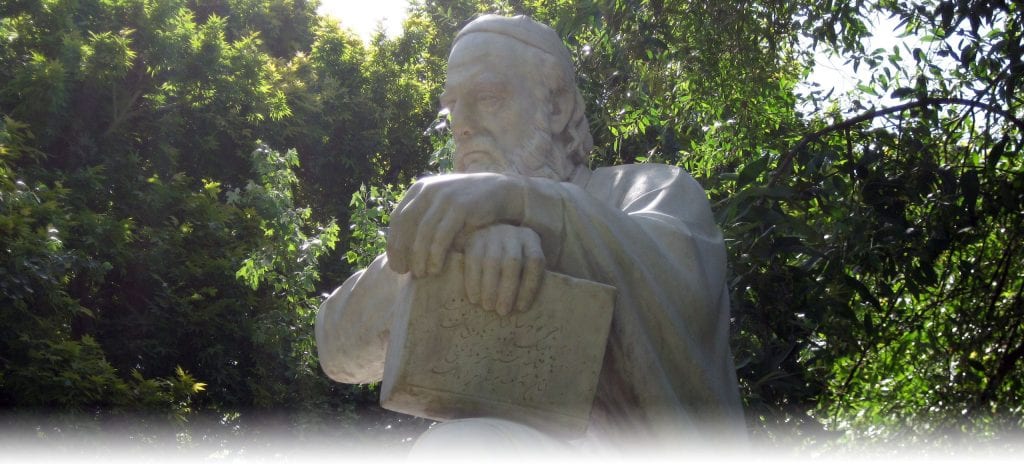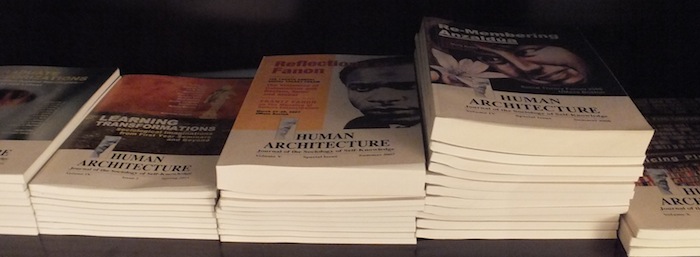HUMAN ARCHITECTURE
Journal of the Sociology of Self-Knowledge
Founding Editor: Mohammad H. Tamdgidi, Ph.D.
About the Journal
Editorial Perspective
Editorial Policy
Submission Guidelines
Editorial Advisory Board
Editor’s Notes (2002-2013)
Previous Issues
About OKCIR’S Journal
Human Architecture: Journal of the Sociology of Self-Knowledge (ISSN # 1540-5699) is published by OKCIR: Omar Khayyam Center for Integrative Research in Utopia, Mysticism, and Science (Utopystics) (www.okcir.com, info[at]okcir.com) and printed by the Okcir Press, an imprint of Ahead Publishing House (APH), P. O. Box 393, Belmont, MA, 02478, U.S.A.. Copyright © by Mohammad H. Tamdgidi and Ahead Publishing House, 2002-Present. All rights reserved. Human Architecture is indexed and compiled (up to and including its volume 16) in EBSCO’s SocINDEX with Full-Text®, ProQuest’s Sociological Abstracts and Social Science Journals, Gale’s Academic OneFile®, Expanded Academic ASAP®, Questia databases. The journal is printed in soft cover and (selectively) in hard cover, and individual article pdfs and full pdf e-book formats.
Editorial Perspective
Human architecture and the sociology of self-knowledge relate to one another as practice to research—as whole to part. Human architecture is about tearing down walls of human alienation, and building integrative human realities in favor of a just global society. The sociology of self-knowledge explores how everyday personal self-knowledges of multiple selves and singular world-historical social structures constitute one another. And the present journal seeks to chronicle the creatively evolving spiral of their dialectical journey toward untapped human potentialities.
Human Architecture maintains that all human failures at self and broader social change in favor of the good life are rooted in the problem of habituation, i.e., the human propensity to become subconsciously attached to sensations, ideas, feelings, things, relations, and processes. Decisive among these habituations are the dualisms of theory/practice, self/society, and matter/mind—by-products of dualistic oppositions of materialist and idealist world outlooks lasting for millennia. These dualisms are responsible for the world-historical fragmentation of the essentially creative human search for the good life into mutually alienated and thereby failing paradigms of philosophy, religion, and science—giving rise to equally fragmented and mutually alienated Western utopian, Eastern mystical, and global scientific movements.
The splitting of the inherently artistic and creative human spirit into its ideological components more or less corresponds to the world-historical transitions of ancient civilizations to classical political, medieval cultural, and modern economic empires—for which the dialectics of nomadic vs. settled modes of life paved the way in the course of an increasingly synchronous global development. The postmodern condition today is the general crisis of all fragmented paradigmatic structures, modern and/or traditional. It follows, then, that the good life will not be the gift of a wise few, of supernatural forces beyond, or of an objectively preordained natural or historical progress. Human de-alienation can only be an artistic endeavor by each and all—only within a creative humanist framework can the habituated dualisms and fragmentations of philosophy, religion, and science be overcome while preserving their true meanings and contributions.
It will be demonstrated that all dualisms can be effectively transcended through their conscious and intentional re-articulation as diverse manifestations of part-whole dialectics. The habituated common sense definition of society as multiple ethno-national and civilizational systems of relations among “individuals”—based on ahistorical presumptions of human “individuality”—will be rejected in favor of its definition as a singular world-historical ensemble of multiple intra-, inter-, and extrapersonal self relations. It will be argued that human life can be harmonious only when it is a world-system of self-determining individualities. Contributions of Western utopianism, Eastern mysticism, and science to an otherwise singular movement in humanist utopystics will be critically explored within an integrative framework. Human architecture will be introduced as the spatiotemporal art of design and construction of part-whole dialecticities in everyday life—of building alternative world-historical realities amid the personal here and now.
Human Architecture provides a forum for the exploration of personal self-knowledges within a re-imagined sociological framework. It seeks to creatively institutionalize new conceptual and curricular structures of knowledge whereby critical study of one’s multiple selves within a singular and increasingly world-historical framework is given educational and pedagogical legitimacy. The journal is a public forum for those who seek to radically understand and, if need be, change their world-historically constructed selves. It is a utopystic research and educational landscape for fostering de-alienated and self-determining human realities.
Human Architecture will transcend the habituated dualisms of young and old, undergraduate and graduate, student and teacher, in and outside classroom, on- and off-campus, academic and non-academic, knowledge and feeling, mind and body, private and public, society and nature, reality and imagination, and philosophy, religion, science, and the arts—East and West. It will disempower the social stratifications of class, status, and power arising from economy, culture, and politics in favor of recognizing the all-encompassing stretch of human alienation—fostering new sociological imaginations more conducive to a shared human liberation project.
Editorial Policy
Contributions to Human Architecture: Journal of the Sociology of Self-Knowledge pass through a rigorous evaluative process with respect to their fit, relevance, coherence of argument, and innovativeness in consideration of the scope, nature, and intended purpose of the journal. The journal adheres to the peer-reviewing principle for advancing scholarship, but aims to design and build new scholarly avenues to meet this requirement—seeking mechanisms that foster independent, creative, and self-empowering initiatives in exploring new scholarly fields and questions; mechanisms that invite constructive judgments subject to free, open, and mutually interactive, not blinded and one-sided, peer reviewing practices; mechanisms that can be employed as widely and dynamically as possible among specialist and interested scholars in the field who value the need for the proliferation of new, critical, and innovative personal and global insights and transformations.
To meet the highest standards of scholarship, liberatory editorial practices need to transition from static peer reviewed to dynamic peer reviewing models that de-couple publication from defective pre-publication peer review requirements, and engage in alternative peer review practices that remain open to all those wishing to review a manuscript at any time in the post-publication phase—encouraging expanded and deepening exchanges among scholars, authors and readers alike. They need to invite critical thinking about prevailing and dominant paradigms and inflame creative spirits to forge new scholarly horizons and intellectual landscapes. And they need to embrace the subaltern voices in the academia and beyond, voices of those who have been deprived of cultivating their sociological imaginations through formal scholarly publishing avenues.
Submission Guidelines
Center and Invited Manuscripts: Human Architecture does not accept unsolicited manuscripts at this time until further notification. It may publish invited manuscripts as well as the manuscript series and working papers of OKCIR: Omar Khayyam Center for Integrative Research in Utopia, Mysticism, and Science (Utopystics). Contributors whose invited works are published extend permission to Human Architecture for the publication of their work in the journal. They retain copyrights to their work and may publish them elsewhere. If the submitted manuscript has been published elsewhere before, written permission from both the author(s) and the publication(s) where it earlier appeared should accompany submission to Human Architecture.
Editorial Decisions Regarding Invited Manuscripts: Human Architecture adheres to the peer reviewing principle for advancing scholarship—seeking innovative ways to meet the need in favor of liberatory scholarly practices most conducive to the aim and purpose of the journal. Invited manuscripts are evaluated based on their substantive relevance and the coherence and innovativeness of their argument in consideration of the perspective of the journal and the mission of OKCIR. Views expressed in the journal by contributors are those of their authors and may not necessarily coincide with one another, or with the views of the editor, members of the Editorial Advisory Board, or the institutions with which any of the above are affiliated. Authors are responsible for the accuracy and integrity of factual, bibliographic, and referential materials used in their own articles, and for obtaining permissions for using copyrighted material in their manuscripts. Methodological, theoretical, historical, empirical, practical, as well as literary and artistic contributions relevant to the mission of the journal are all encouraged. The primary language used is English, but material in other languages may be included if relevant to the purpose of the journal.
How to Submit Invited Manuscripts: Please again note that Human Architecture does not accept unsolicited manuscripts at this time until further notification. All invited manuscripts should be submitted in electronic format. They should preferably be double-spaced in Times 12 typeface., with 1 inch margins all around. In general, please follow the ASA (American Sociological Association) style guide, or a consistent bibliographic and citation style of your choice, throughout the manuscript.
Where to Submit: The Editor, Human Architecture, Okcir Press, Ahead Publishing House, e-mail: journal[at]okcir.com.
Rates: For the most recent rates, discounts, and shipping charges, please visit the Okcir Store. All rates are subject to change without prior notice.
Inquiries: Address all correspondence and requests to Human Architecture, Okcir Press, Ahead Publishing House, e-mail: journal[at]okcir.com. The best way to contact the journal and its editor is via email correspondence.
Changes of Address: Six weeks’ advance notice must be given when notifying change of address. Please include both the old and the new address in your written/e-mailed request. Postmaster: Send address changes to the Okcir Press, Ahead Publishing House, P. O. Box 393, Belmont, MA, 02478, U.S.A.
In Honor of
Jesse Reichek (1916-2005)
Professor of Design
U. C. Berkeley
Terence K. Hopkins (1918-1997)
Professor of Sociology and
Founding Director of the Graduate Program in Sociology
Binghamton University
Editorial Advisory Board
| Bart Bonikowski Assistant Professor of Sociology Harvard UniversityDavid Baronov Professor of Sociology St. John Fisher CollegeAnna Beckwith Lecturer II of Sociology UMass BostonJay Dee Associate Professor of Higher Education UMass Boston Alicia Dowd Leila Farsakh Benjamin Frymer Bryan Gangemi Chris Gauthier Lewis R. Gordon Panayota Gounari Ramón Grosfoguel Jenna Howard Tu Huynh Terry-Ann Jones Philip Kretsedemas Jennifer McFarlane-Harris Neil G. McLaughlin Jonathan Martin Askold Melnyczuk
|
Aundra Saa Meroe Senior Researcher of Sociology University of ChicagoEric Mielants Associate Professor of Sociology Fairfield UniversityMartha Montero-Sieburth Professor Emeritus of Higher Education Administration and Leadership Graduate College of Education UMass BostonAnthony Nadler Assistant Professor Media and Communication Studies Ursinus College Dorothy Shubow Nelson Dylan Rodriguez Khaldoun Samman Emmett Schaefer Ingrid Semaan Frank Scherer Santiago E. Slabodsky Rajini Srikanth Shirley Tang Peter Van Do Aleksandra Wagner Rika Yonemura Samuel Zalanga Vivian Zamel |



